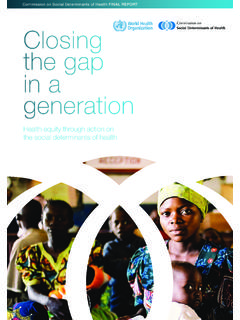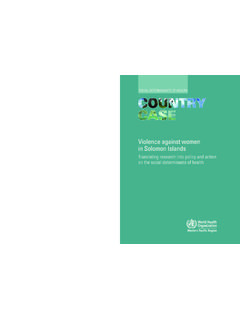Transcription of COMMISSION ON SOCIAL DETERMINANTS OF …
1 COMMISSION ON SOCIAL DETERMINANTS OF health A Conceptual Framework for Action on the SOCIAL DETERMINANTS of health Discussion paper for the COMMISSION on SOCIAL DETERMINANTS of health DRAFT April 2007 CSDH framework for action Last version A first draft of this paper was prepared for the May 2005 Cairo meeting of the COMMISSION on SOCIAL DETERMINANTS of health by the COMMISSION secretariat, based in the Department of Equity, Poverty and SOCIAL DETERMINANTS of health , Evidence and Information for Policy Cluster, WHO Geneva. The principal writers were Orielle Solar and Alec Irwin. Valuable input to the original draft was provided by other members of the COMMISSION secretariat, in particular Jeanette Vega. In the course of discussions in Cairo, Commissioners and the Chair contributed substantive insights. Commissioners recommended the preparation of a revised draft paper, which was completed in January 2007.
2 It is planned that the current version of the paper will be submitted to CSDH Commissioners at their June 2007 meeting in Vancouver. In addition to the Chair and Commissioners of the CSDH, many colleagues have offered valuable comments and suggestions in the course of the revision process. Thanks are due in particular to: Joan Benach, Sharon Friel, Tanja Houweling, Ron Labonte, Carles Muntaner, Ted Schrecker, Sarah Simpson and Jeanette Vega. Any errors are solely the responsibility of the principal writers 2 CSDH framework for action Last version TABLE OF CONTENTS I. II. Historical III. Defining core values: health equity, human rights and distribution of the IV. Previous theories and models Current directions in SDH and mechanisms through which SDH influence V. CSDH framework for action of constructing a model for the of power to guide action on SOCIAL DETERMINANTS .
3 16 of the Diderichsen model for the CSDH element of the CSDH framework : socio-economic and political 21 element of the framework: structural DETERMINANTS and socioeconomic element of the framework: intermediary on Equity in health and well-being 43 of the mechanisms and pathways represented in the form of the CSDH VI. Policies and interventions and for policy analysis and dimensions and directions for VII. References 3 CSDH framework for action Last version A conceptual framework for action on the SOCIAL DETERMINANTS of health I. Introduction When he announced his intention to create the COMMISSION on SOCIAL DETERMINANTS of health (CSDH), WHO Director-General Lee Jong-wook identified the COMMISSION as part of a comprehensive effort to promote greater equity in global health , in a spirit of SOCIAL justice1.
4 The COMMISSION s goal, then, is to advance health equity, driving action to reduce health differences among SOCIAL groups, within and between countries. Getting to grips with this mission requires finding answers to three fundamental problems: 1. Where do health differences among SOCIAL groups originate, if we trace them back to their deepest roots? 2. What pathways lead from root causes to the stark differences in health status observed at the population level? 3. In light of the answers to the first two questions, where and how should we intervene to reduce health inequities? This paper seeks to make explicit a shared understanding of these issues that can orient the work of the CSDH. The paper adopts the following structure. First, we recall the historical trajectory of which the CSDH forms a part. Then, we make explicit the COMMISSION s fundamental values, in particular the concept of health equity and the commitment to human rights.
5 We describe the broad outlines of current major theories on the SOCIAL DETERMINANTS of health , and review perspectives on the causal pathways that lead from SOCIAL conditions to differential health outcomes. Then a new framework for analysis and action on SOCIAL DETERMINANTS is presented in several stages, as a specific contribution of the CSDH. The CSDH framework synthesizes many elements from previous models, yet we believe it represents a meaningful advance. We ground the framework in a theorization of SOCIAL power and make clear our debt to the work of Diderichsen and colleagues. We present the core components of the framework, including: (1) socioeconomic and political context; (2) structural DETERMINANTS of health inequities; and (3) intermediary DETERMINANTS of health . Our answers to the first two questions above will be articulated by way of these concepts.
6 In the last section of the paper, we deduce key directions for pro-equity policy action based on the framework, providing broad elements of a response to the third question. An important definitional issue must be clarified in advance. The CSDH has purposely adopted a broad initial definition of the SOCIAL DETERMINANTS of health (SDH). The concept encompasses the full set of SOCIAL conditions in which people live and work, summarized in Tarlov's phrase as "the SOCIAL characteristics within which living takes place".2 A broad initial definition of SDH is important in order not to foreclose fruitful avenues of investigation. However, within the field encompassed by this concept, not all factors have equal importance. Causal hierarchies will be ascertained, leading to crucial Much of this paper will be concerned with clarifying these distinctions and making explicit the relationships between underlying DETERMINANTS of health inequities and the more immediate DETERMINANTS of individual health .
7 4 CSDH framework for action Last version II. Historical trajectory health is a complex phenomenon, and can be approached from many angles. Over recent decades, international health agendas have tended to oscillate between: (1) approaches relying on narrowly defined, technology-based medical and public health interventions; and (2) an understanding of health as a SOCIAL phenomenon, requiring more complex forms of intersectoral policy action, and sometimes linked to a broader SOCIAL justice agenda. WHO s 1948 Constitution clearly acknowledge the impact of SOCIAL and political conditions on health , and the need for collaboration with sectors such as agriculture, education, housing and SOCIAL welfare to achieve health gains. During the 1950s and 60s, however, WHO and other global health actors emphasized technology-driven, vertical campaigns targeting specific diseases, with little regard for SOCIAL A SOCIAL model of health was revived by the 1978 Alma-Ata Declaration on Primary health Care and the ensuing health for All movement, which reasserted the need to strengthen health equity by addressing SOCIAL conditions through intersectoral programmes.
8 Many governments embraced the principle of intersectoral action on SDH under the banner of health for All. However, the neoliberal economic models that gained global ascendancy during the 1980s created obstacles to policy action on SDH. In the health sector, neoliberal approaches mandated market-oriented reforms that emphasized efficiency over equity as a system goal and often reduced disadvantaged SOCIAL groups access to health care On the level of macroeconomic policy, the structural adjustment programmes (SAPs) imposed on many developing countries by the international financial institutions mandated sharp reductions in governments SOCIAL sector spending, constraining policymakers capacity to address key Even as neoliberal policies were applied in both developing and developed countries, new, more systematic analyses of the powerful impact of SOCIAL conditions on health began to emerge.
9 A series of prominent studies, including those of McKeown and Illich, challenged the dominant biomedical paradigm and debunked the idea that better medical care alone can generate major gains in population health 7. Great Britain s Black report on inequalities in health (1980) marked a milestone in understanding how SOCIAL conditions shape health inequities. Black and his colleagues argued that reducing health gaps between privileged and disadvantaged SOCIAL groups in Britain would require ambitious interventions in sectors such as education, housing and SOCIAL welfare, in addition to improved clinical Through the 1980s and early 90s, the Black report sparked debates and inspired a series of national inquiries into health inequities in other countries, , the Netherlands, Spain and Sweden. The pervasive effects of SOCIAL gradients on health were progressively clarified, in particular by the Whitehall studies of comparative health outcomes among British civil servants9.
10 Important work at WHO s European Office in the early 90s laid conceptual foundations for a new health equity agenda, and the vocabulary of SDH began to achieve wider By the late 1990s and early 2000s, health equity and the SOCIAL DETERMINANTS of health had been embraced as explicit policy concerns by a growing number of countries, particularly but not exclusively in Europe, in response to mounting documentation of the scope of inequities, and evidence that existing health and SOCIAL policies had failed to reduce equity In the UK, the arrival in 1997 of a Labour government explicitly committed to reducing health inequalities focused fresh attention on SDH. Australia and New Zealand explored options for addressing 5 CSDH framework for action Last version health DETERMINANTS , with New Zealand s 2000 health strategy reflecting a strong SDH focus12.
















